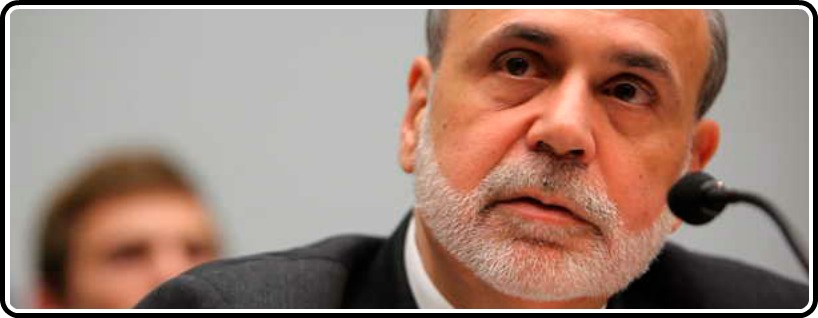Non-fiction cinema, since the 2008 housing crisis, has seemingly been infatuated with modern American economics, and its effect on the world’s economic status. Be it dense, information driven masterpieces like Inside Job to something like the human-driven As Goes Janesville, modern non-fiction cinema has directly set its sights on one of this generation’s great issues. However, what about the future? What about the next crisis?
That is the focus of a new documentary from director Jim Bruce, a film entitled Money For Nothing: Inside The Federal Reserve. Firmly sitting in the camp with films from directors like Craig Ferguson, this densely rich documentary attempts to, with as much seemingly hard to decipher detail as intellectually possible, dig into not only modern worldly economics, but more centrally the US central bank, the Federal Reserve.
Now, while the film itself attempts to look forward, it is also entirely impossible not to take a great deal of time figuring out why what happened in 2008 actually happened. Central to this film is the idea, or more so the question, of why, in 2008 and since, instead of being a contained housing problem, a myriad of other economic systems seemed to fail. At this film’s absolutely greatest, it becomes a thrillingly dense discussion of the inherent problems with modern American economics, and with a cavalcade of talking heads going through each and every detail with a great deal of simplicity the film never feels too cumbersome or arduous, despite being thrillingly opaque.
And yet, in this discussion of the past, the one real villain here comes to light, that being the Federal Reserve. Launched thanks to the Federal Reserve Act in late 1913 and signed into law that same year, the Fed has had a history of being somewhat problematic, even not being entirely aware of what they actually do. Initially created to stabilize the US economy during the days of the gold standard, the Federal Reserve also helps stabilize and set interest rates and ostensibly avoid becoming an economically unstable nation. And what good they’ve done.
All joking aside, the film proves that almost from the very beginning of its existence the Fed has been far more problematic than it has been problem-averting. The film, in what may be its greatest stroke of intellectual genius, has no issue in portraying the Federal Reserve as rightly problematic, taking everything from the aforementioned talking head interviews to actual interviews with Chairman Ben Bernanke himself unsure about what the Fed actually does, this is an anger-inducing documentary that will both add insight into an economic structure that most people know little to nothing about and make that same person’s blood pressure rise due to just how knotty it truly is.
Aesthetically, the film is relatively standard documentary fair. Mostly interesting for its discussion of the history of Federal Reserve and how things like the Vietnam War ultimately spurned the Fed into what it truly is today, the film won’t be breaking new documentary ground like the brazenly dense Ferguson documentary previously mentioned or the naturalistic Janesville also mentioned above.
The film consists primarily of the previously mentioned talking heads waxing philosophic about the history of and problems caused by the Federal Reserve, and while there are few answers given as to what we all as a society should do to fix it other than to either reform the Fed or entirely burn it to the ground, it is something of a gem of a non-fiction treatise on a government body so in cahoots with big money that they’ve forever changed our economy. A thrillingly dense documentary that will enlighten and infuriate, the picture may bring to light a myriad of questions (how could this happen? Where did it all go wrong? What can be done to stop it?) but as with many documentaries looking at the economic crisis of this new generation, one issue will always be at the root of all human problems, and that is flawed human nature. This may not be a groundbreaking piece of non-fiction aesthetics, but it is an important piece of documentary cinema that needs to be seen by anyone and everyone.




![Bergman Island (The Criterion Collection) [Blu-ray]](https://criterioncast.com/wp-content/uploads/2022/11/bergman-island-the-criterion-collection-blu-ray-400x496.jpg)
![This Is Not a Burial, It’s a Resurrection (The Criterion Collection) [Blu-ray]](https://criterioncast.com/wp-content/uploads/2022/11/this-is-not-a-burial-its-a-resurrection-the-criterion-collection-blu-ray-400x496.jpg)
![Lars von Trier's Europe Trilogy (The Criterion Collection) [The Element of Crime/Epidemic/Europa] [Blu-ray]](https://criterioncast.com/wp-content/uploads/2022/11/lars-von-triers-europe-trilogy-the-criterion-collection-the-element-of-400x496.jpg)
![Imitation of Life (The Criterion Collection) [Blu-ray]](https://criterioncast.com/wp-content/uploads/2022/11/imitation-of-life-the-criterion-collection-blu-ray-400x496.jpg)
![The Adventures of Baron Munchausen (The Criterion Collection) [4K UHD]](https://criterioncast.com/wp-content/uploads/2022/11/the-adventures-of-baron-munchausen-the-criterion-collection-4k-uhd-400x496.jpg)
![Cooley High [Criterion Collection] [Blu-ray] [1975]](https://criterioncast.com/wp-content/uploads/2022/11/cooley-high-criterion-collection-blu-ray-1975-400x496.jpg)